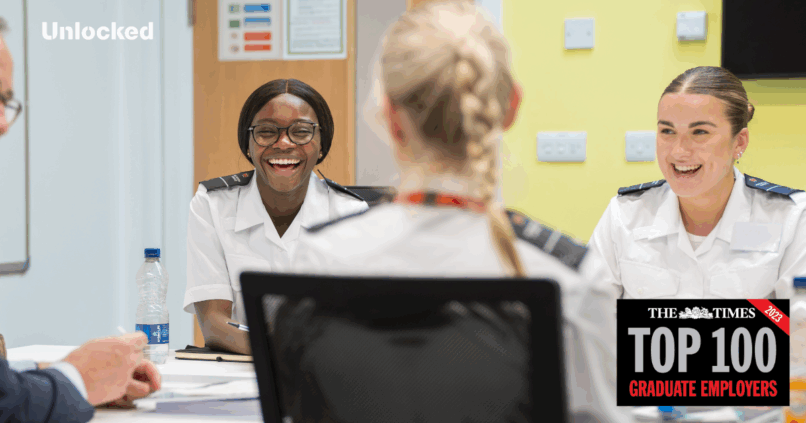On 20th September 2023, The Times Top 100 Graduate Employers announced that Unlocked Graduates had risen to number 22 in the 2023 list. This makes Unlocked Graduates the highest rising employer, up from number 67 in 2022.

We spoke with Unlocked Graduates CEO and founder Natasha Porter OBE about how we built a prestigious graduate programme in a prison:
“When we first decided to start a graduate programme recruiting to the prison officer role, the statistics were not in our favour. We worked with a very well-established graduate recruitment polling organisation to identify our potential pool of recruits, and let’s just say, at least it was unlikely to get any worse. We asked about the prison service rather than focusing specifically on the prison officer role, but the data was stubbornly pessimistic – graduates from the most academically selective universities could not imagine a lower status sector to work in than prisons, and very, very few would ever consider applying. In fact, one of the clearest data points was the 0% of men at Oxbridge who said they found the sector in any way appealing.
The problem with the prison officer job is that it has a bad reputation, and most ideas people have of the role are wildly inaccurate. Most of us don’t think much about what life is like inside prisons, and we accept what we see on TV and in films. This means Orange is the New Black or Porridge are a baseline for what the role entails, leading to unfair perceptions around prison staff being stupid, violent and corrupt. Let’s not even talk about prison officers in the global cultural phenomenon that is Harry Potter; Dementors who literally feed on human joy, leaving depression and despair in all who get close to them. This all contributes to negative views of a prison officer career: “The job sounds boring,” said one uni grad, “not intellectually challenging enough, a waste of my time,” from another.
But here is the crux of the matter. Actually, there is lots to like about the reality of the job of the prison officer. Of course there are downsides, and many of these are very well documented, however, what is much less well known are the amazingly positive experiences officers have. Graduates are looking for a job that allows them to give something back, they want to be challenged and stretched on a day-to-day basis, and receive an early opportunity to work closely and regularly with ‘clients or customers’. All of which you get in abundance as a prison officer. Participants on the Unlocked programme have worked with their colleagues to redesign prison policies around support and care for new prisoners to reduce self-harm and suicide, facilitate mini libraries and book clubs being set up on wings of prisons, built up evidence against those prisoners bringing drugs and weapons into prison and helped make this environment safer. They have also set up new living areas in their prisons which are drug-free, or which specifically support prisoners with learning disabilities.
“I don’t know what prison officers do other than guard cells,” said one final-year student. Well let me tell you, they do a lot, and much of it can be hugely intellectually stimulating, creative and rewarding.
And that is before we get into the pay. Participants working a 39-hour week in inner London get a £38,445 starting salary, and employer pension contributions over 25%. If you’re joining through the Unlocked programme, you also get a fully funded Master’s degree, intensive coaching and mentoring, a work placement opportunity and you get to be part of a group of like-minded people all working together to make prisons a place that can break cycles of reoffending, rather than teach people how to just survive prison.

This year we had 30 applications for every place on our programme. We have been voted the 22nd best graduate employer by thousands of graduates. They must recognise the prestige of a programme that allows participants to do amazing work with a group of people who need expert support from incredible public servants. This is a great opportunity for anyone wanting to develop leadership skills: over 50 per cent of Unlocked participants are promoted, and every single governor we work with states that they would recommend the programme to their colleagues.
How have we done it?
We’ve done it by showing people what the best prison officers actually do, as well as the incredible scope they have to drive change in a work environment which I have come to believe is the ultimate school for people who want to be great change-makers.
A good friend of mine always says that whatever social issue you care about, it will exist in its most extreme form in our prisons. And so, if we want to be involved in solving the most entrenched social issues, if we want to make society safer, if we want to make society fairer, then prison is the best possible place to be.”